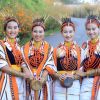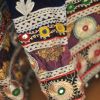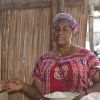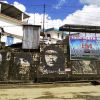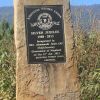The search found 31 results in 0.02 seconds.
Search results
Naga identity has been, in a major way, shaped by orality and Naga history. Its culture and literature have been handed down via the spoken word over generations and is still revered as a custodian of its customs, beliefs and way of life. In the present times however, with orality fast disappearing, there is an urgent need to preserve those narratives in print so that the younger generations too have access to their roots, and that tradition can meet modernity in some manner.
Despite “customary” restrictions, Naga women have successfully paved their way in various fields ranging from politics to literature. In the field of music, we have the Tetseo Sisters, a quartet of four siblings (Alunë or Lulu, Kuvelü or Kuku, Mütsevelü or Mercy and Azi Tetseo) who, through their music and storytelling, celebrate the beauty of the hills and valleys of their native place. Belonging to the Chakhesang tribe and based out of Kohima, the band was formed in 1994 and they strive to preserve the tradition of "Li", which in the Chokri Naga language means "folk songs".
Femmes for Freedom (FFF) is a feminist organization founded by Shirin Musa in the Hague, Netherlands, in 2011. It aims to defend girls’ and women’s rights and advocate against gender-based violence, particularly, marital captivity (Femmes For Freedom, 2022). FFF noticed that several women victims that reached out to them for help had met their husbands through matrimonial sites, which is a variation of standard dating websites. However, the main focus is on those wanting marriage, instead of simply dating (Soneji, 2022).
This beautiful embroidery from Afghanistan is commonly done on velvet, in this case a soft royal blue fabric, that highlights the embroidery very well.
The traders here accept all the three West African Currencies for transactions (CFA, Niara, Ghana Cedis). Irrespective of whichever currency a buyer offers, the shopkeepers are able to convert and give change when required. It is interesting how they (shopkeepers) are not limited in anyway among themselves despite the physical border restrictions.
Every mother tongue has sounds and sighs that utter laments and express hope. The word Ayaakho Ojala is derived from the Ao Indigenous tribal language and is the ultimate angst that is often invoked by women. It signifies a mother’s strength and comfort. As a woman utters it, she finds relief and rest from the pain of patriarchy that seeks to crush her down.
When the day came to be, Kohima was resplendent in sunshine. It was January 10, 2018, the first Naga Day. At the Kohima Local Ground, Khuochiezie, music played from the early morning hours.In the surrounding market area, people hummed the tunes as they set up shop. Some planned to go to the ground, some planned to watch from their terraces—everyone had heard this one thing, Nagas from everywhere were coming together.
This is a choir from the Chedema Baptist Church singing on the occassion of the 69th Naga Plebiscite Day.
It talks of a creator, Christ in heaven, who be praised and who blesses the congregation to stay together as one.
The Naga nation is that one holy congregation which seeks to remain as one, together in its mission to spread the word of God.
This song "Rise, Naga Woman" composed by Theyiesinuo Keditsu, music by Khyochano TCK and Topeni as soloist, was chosen as the winner for the ‘State Theme Song for Women’ and was released by the State Resource Centre for Women (SRCW) under the aegis of the Nagaland State Social Welfare Board (NSSWB) during a program organised to observe the International Day for the elimination of violence against women.
The song speaks to Naga women and asks them to spread their wings and rise up against discrimination and inspire all of Nagaland and take them to a glorious future.
In urban and suburban Nagaland, as in many of the conflict-affected regions of India's North-East, such signs calling into action people and collectives are commonly visible. In this poster, the church as site of popular resistance is agency for mobilisation of constituencies such as the youth towards a unified struggle for the Naga nation.
In the remote Naga hills , beyond the capital city of Kohima, stands the beautiful and historic village of Khonoma. Traditionally a site of resistance, having pushed back British rule in the region from the 1830s to 1880, Khonoma continues to be a space striving towards safeguarding the rights of women while strengthening Naga unity through organisations like the Khonoma Women Union, in whose honour this obelisk stands marking its 25 years in 2013.
Pages



